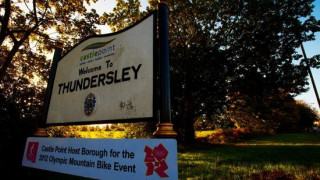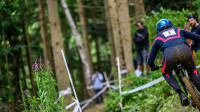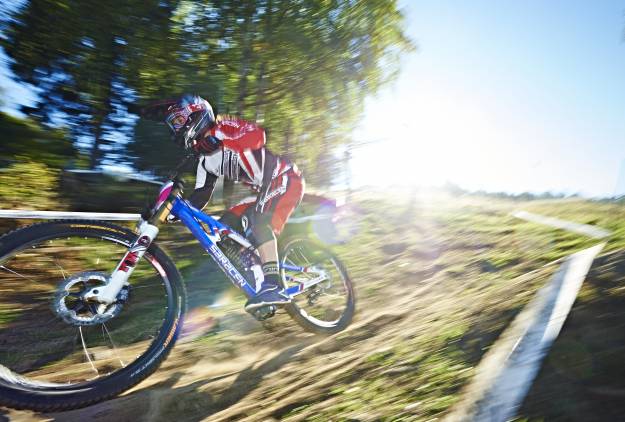| Follow britishcycling.org.uk on |
|
|
Road To 2012
Dispelling The Olympic Mountain Bike Venue Myths
Homepage: Road To 2012 | British Cycling's Performance Programs Explained
Team GB Mountain Bike Roster | Join Team GB
Mountain Biking: Olympic Qualification Explained | UCI National Rankings
BACKGROUND
Following the recent unveiling of the Olympic mountain bike venue, there was an unprecedented reaction from journalists, forum dwellers and cross country racing experts alike. However, not all of this reaction was well informed; much of it ignored the Olympic context and also the way the sport itself has changed in recent years. British Cycling's Mountain Bike Editor Luke Webber deconstructs the myths surrounding Britain's biggest ever mountain bike race and looks at why Hadleigh Farm was chosen as the 2012 mountain biking venue.
Entering an Olympic Borough - already, the signs are there...
Depending on who you listened to, the unveiling of the venue for the 2012 Olympic Mountain Bike event last week revealed the course to be either, at one end of the scale, "on a par with or better than Dalby" or, at the other end, one which "vastly overlooks the potential of the sport." Throw in a handful of misquoted facts and figures, endless opinion and speculation and you're left wondering who to believe.
And bringing all this into perspective will be a review post-2012 of mountain biking's relevance as an Olympic event; a timely reminder of the importance Olympic status brings to any sport - including publicity, funding and respectability.
What follows is an exhaustive feature, detailing everything known about the London 2012 Olympic Mountain Bike Event.
Timeline To 2012
1996: Mountain Biking's first Olympic inclusion
2003: Proposal for London 2012 submitted
2004: Athens Olympic Mountain Bike Event
2005: London awarded 2012 Olympic Games
2006: Liam Killeen Commonwealth Games Gold
2008: Beijing Olympic Mountain Bike Event
2009: UCI approve Hadleigh Farm as Olympic venue
2010: Olympic MTB Manager appointed, course build
2011: Course build complete, tickets on sale, Test Event
2012: London Olympic Mountain Bike Event
LOCATION, LOCATION, LOCATION
Let's start with analysing the location, since that has dominated the thoughts of those into column inch counting. Hadleigh Farm, near Basildon in Essex was not the first venue proposed for the 2012 Olympic Mountain Bike race - that honour went to Weald Country Park.
Key Organisations And Roles:
LOGOG: responsible for event delivery
Essex County Council: Olympic Delivery Authority
Salvation Army: Event partners, landowners
Castle Point County Castle: Planning authority
Back in 2003 - before the Athens Olympic Mountain Bike event - LOCOG described Weald Country Park as working "very well from an event perspective." But following the success of the 2012 bid, there was further consultation with the UCI, as David Luckes - LOCOG's Head of Sport and Competition - explains.

David Luckes presents at the launch of Hadleigh Farm as the Olympic mountain bike venue
"In line with recognising that mountain biking is a very young sport, still developing, still evolving, we discussed with the UCI the possibility of creating a more challenging course. I think we were very keen to work with the partners we had in Essex to explore that opportunity.
"So we went back to come up with a viable alternative venue and after many evaluations we came up with Hadleigh Farm as being the place that gives us the best opportunity to maximise the potential of the Olympic Mountain Bike Event - not only for the riders but also the spectators and broadcasters.
"The key thing about Weald and Hadleigh Farm is that both were close to the Olympic Village. And when we went through the bid, we took on board the athlete experience - the ability for riders to train on the course and live in the village - a direct result of having the event in Essex."

Another overview of the Hadleigh Farm venue and one of the first constructed trails
According to Luckes, the UCI have been involved every step of the way in this process - from assessment of the venues, to site visits - seeing the opportunity to maximise the exposure of the sport alongside the Hadleigh Farm venue.
Indeed, the UCI's Peter Van den Abeele visited the course last week, and left with a positive impression.
"We are confident that the combination of technical climbs and steep rocky descents will provide a stunning, challenging course for mountain biking and that it will be a great event in London 2012."
But what of that vision to maximise the exposure of the sport - how does that impact on the race itself?

The on-paper plan for the Olympic course - as approved by the UCI
ALTERNATIVE VENUES, EXISTING OPTIONS
Obviously, many mountain bikers in Britain would have preferred the race to be at an existing trail centre - but there are several problems with that ideology.
For the Olympic Mountain Bike Event to be considered a success, tickets have to sell out, television viewing figures have to be high, there has to be a legacy of increased participation in the sport and mountain biking has to be seen to have reached a new audience. And you won't achieve those objectives by putting the World's most prestigious mountain bike race in the middle of nowhere, with a pre-existing facility, an established following and a low population density.
Beauty and the bike. Coming to London in 2012.
The plan for Hadleigh Farm - as further detailed in the legacy section of this article - is for an all-new World Class, publicly accessible mountain bike venue, in a location that not only previously lacked one, but was stereotyped as unable to be home to the sport.
Even discounting all the above points, running the Olympic Mountain Bike Race at Hadleigh should dispel, once and for all, the notion that you need a mountain to create a good off-road facility - and most importantly encourage people into the sport.
Setting a positive and easily repeatable precedent at Hadleigh should create the potential for many more local authorities across the country to see mountain biking as a viable investment and integration into its leisure facilities.

MEDIA AND SPECTATOR OPPORTUNITIES
Hadleigh means that the event will be close to the Olympic Village, near significant centres of population and in an open, spectator-friendly environment. Combine this with some of the cheapest ticket prices for watching an Olympic Gold Medal being won, and the event is likely to be a sell-out.
However, the biggest viewer numbers will have to come from television. And the televising of the event has to be seen in the context of the coverage of previous cross country races which demand many varied camera positions. In Beijing that meant 42 cameras at the 2008 Olympic event over two days - something the UCI and the IOC have already made it clear is not sustainable and cannot be repeated.
With its open course including very few enclosed, wooded sections, the Hadleigh event will require less than half of that number of cameras. This makes good television coverage more viable, with options to base race broadcasts on Formula One production values - a benchmark in the industry.
With this in mind, a compact 5km course where it's possible to see half of the track from any one vantage point was the only sensible option and something which the UCI are also committed to beyond the Olympic event. Their vision is redefining the notion that cross country mountain bike racing must be in a remote location, surrounded by trees and as a result difficult for TV crews to access.

A dream for television production and spectators alike; London 2012 aims to redefine mountain biking
as a realisticly watchable sport - a key element in bringing cross country to the masses.
THE COURSE
Such considerations were essential to the planning of the 2012 Olympic Mountain Bike course. Before analysing the course itself, it is important to note that the Olympic mountain bike lap must firstly conform to such rules set by the UCI. These regulations are non-negotiable and have changed significantly over the past decade - something which also encouraged the course to be moved from Weald Country Park to Hadleigh Farm.
Vital Statistics
Location: Hadleigh Farm, Essex
Race Dates: August 11-12 2012
Venue to Olympic Village: 38 miles
Lap Distance: 5.1km
Lap Duration: 12-15 minutes
Cost of course build: £800,000
Course Build - Start: July 2010
Course Build - Completion: March 2011
Current Course Completion Rate: 60%
Tickets On Sale: March 2011
Ticket Availability: 20,000 per day
Ticket Price: £20 or £45
TV Camera Positions: 20
TV Coverage: Live on BBC
In 2011 the UCI are expected to recommend that, for a men's cross country mountain bike event, a race time of under two hours, a course length of 4-6km and lap times close to 15 minutes are ideal.
Current regulations state courses should be wholly rideable, even in extreme weather and tarmac sections should not exceed 15% of the lap. Extended singletrack must contain periodic passing sections.
Taking this into account - along with the statutory need for a wide, flat start/finish area lasting 150 metres, a technical assistance and feed zone which must be on a flat, wide area and sufficient passing areas between singletrack or downhill features, it can be concluded that the longest possible climb will be of no more than eight minutes duration. This presumes only one climb per lap of racing and therefore one descent.
Far more realistic would be three climbs of three minutes each and three downhill features; something much more in keeping with the current best World Cup venue Dalby Forest, the former best World Cup venue of Offenburg, Germany and the proposed London Olympic course.

Dalby Forest: an award-winning stepping-stone toward the future of cross country World Cup racing
COURSE STATISTICS
The final caveat from the UCI is that all courses must include significant amounts of climbing and descending - something which has been questioned by many.
With the course incomplete, the best indication of climbing can be summarised using statistics for total elevation.
Dalby - Voted best Cross Country Mountain Bike World Cup - 83 metres of vertical gain
Hadleigh Farm - 2012 Olympic Mountain Bike Venue - 70 meters of vertical gain
Beijing - 2008 Olympic Mountain Bike Venue - 55 metres of vertical gain
When considering vertical gain (total elevation from the lowest to the highest point of the course) it is important to recognise that the longest climb at Dalby only utilised 70 metres of a potential 83 metres. Should Hadleigh use all of its height gain, the numbers will match Dalby.

The Olympic Mountain Bike Venue paints its first brushstrokes upon the Constable-esque landscape
However, comparing the 2012 Olympic course to any other is, at this stage, difficult; not least because ground works are only 60% complete. With the most technical and extended descent still to be constructed, the laid trail requiring time to bed in and changes still possible after the completion date of March 2011, the elements of the course currently visible should only be viewed as a first impression - the first brush strokes on a canvas.
When compared to Dalby - the course that won the UCI's event for the best World Cup of 2010 - the Hadleigh course has much in common. Most technical sections will be manmade to be resistant to the worst weather; rocks and earth will be shipped in and most sections will be surfaced.
As with the construction of Dalby, we can expect to see course changes after the initial build period is complete.

The first tyres to cross the Olympic course. Be assured Dalby looked this smooth during construction, but if you visit the World Cup venue today, it's a far rougher ride after an extended bedding in period.
NO EXPO AREA
As this is the Olympics and not a World Cup event, riders will be racing for their countries in a non-commercial entity (as is common at World Cup events). This means the Olympic venue itself will be a capsule. There will be no commercial trucks (think SRAM, Shimano etc) on site and athletes will be based in the Olympic Village - transported to and from the venue for training and racing on a pre-arranged travel route.
Essential National Federation vehicles will be granted access to an area closer to the site and, much like current World Cup and World Championship events, will then proceed on foot with equipment required for the technical assistance/feed zone.
For spectators there will be no vehicular access to the race venue itself. To get on site, everyone will be transported from the local area to the venue itself in shuttle busses, or arrive on foot.

It's the pits! Or, more accurately the Technical Assistance Zone. Riders can get food, drink or a spare wheel twice a lap here, whereas a consumer expo area simply won't happen.
LEGACY EXPLAINED
But after all of this coverage will there actually be infrastructure available as part of an Olympic mountain biking legacy?
According to LOCOG, Essex County Council and the land owners, the Salvation Army, discussions are at an early stage, with the biggest challenge concerning the challenging nature of certain elements of the track and their place in a public facility.
However, we can be assured that legacy beyond the trail itself is already being considered, with local business opportunities to support the local community and cycling industry a key consideration.

Major John Warner addresses the media assembled at Hadleigh Farm
Finally, should there be any doubts over the commitment of the Salvation Army to the Olympic cause, Major John Warner aimed to put them at ease, when speaking at the media presentation - while acknowledging concerns of the local community concerning the local beauty spot.
"There have been numerous challenges to overcome - not least by those who believed the Salvation Army would desert their heritage by allowing this beautiful land to be spoiled. Nothing could be further from the truth. We have every reason to be thrilled the Olympic mountain bike race is coming to Hadleigh. I know of very few other locations that offer such magnificent scenery. It's our hope that this event will bring a lasting benefit for the local community - a benefit that we hope will be worth more than gold."
In conclusion, the Olympic mountain bike race will be the biggest off-road event to hit Britain to-date, dwarfing even the acclaimed 2007 World Championships, held in Fort William.
The opportunities therein to showcase mountain biking, to profit from the ever-increasing popularity of cycling and to leave a true legacy post-2012 are almost limitless. But with a team of experienced professionals delivering the event itself there's little reason at this early stage to doubt the event's potential.











